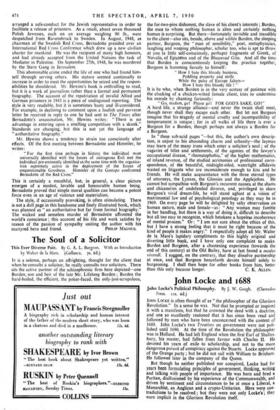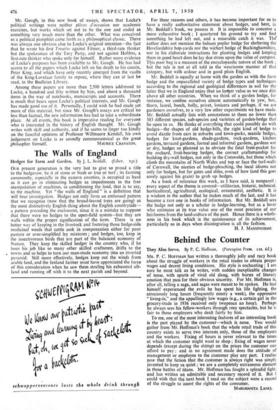John Locke and 1688
JOHN LOCKE is often thought of as " the philosopher of the Glorious Revolution." In a sense he was. Not that he prompted or inspired it with a manifesto, but that he crowned the deed with a doctrine, and one so excellently reasoned that it has since been read and followed by men who have been unconcerned with the context of 1688. JOhn Locke's two Treatises on government were not pub- lished until 1690. At the time of the Revolution the philosopher was in Holland. He had left England when the first Earl of Shaftes- bury, his master, had fallen from favour with Charles H. He devoted his years of exile to scholarship, and not to the more dangerous pursuit of conspiracy against the Stuarts. Locke approved of the Orange party ; but he did not sail with William to Brixham. He followed later in the company of the Queen.
But though he neither published nor conspired, Locke had for years been formulating principles of government, thinking, writing and talking with people of importance. He was born and bred Puritan, disillusioned by his experience of the Commonwealth, and driven by sentiment and circumstances to be at once a Liberal, Monarchist, an Anglican and a crypto-Unitarian. Here were con- tradictions to be resolved ; but they were not only Locke's ; they were implicit in the Glorious rtevolution Mr. Gough, in this new book of essays, shows that Locke's political writings were neither pieces d'occasion nor academic exercises, but works which set out to be the one and ended as something very much more than the other. What was conceived as a political pamphlet came forth as a philosophical classic. There was always one obvious clue to Locke's original intention—the fact that he wrote his first Treatise against Filmer, a third-rate thinker but the spokesman of the Tory Party, and not against Hobbes, a first-rate thinker who spoke only for himself. Rather more evidence of Locke's purposes has been available to Mr. Gough. He has had access to all the papers which Locke left on his death to his cousin, Peter King, and which have only recently emerged from the vaults of the King-Lovelace family to repose, where they can at last be read, in the Bodleian Library.
Among these papers are more than 2,500 letters addressed to Locke, a hundred and fifty written by him, and about a thousand items in the way of notebooks, manuscripts and accounts. There is much that bears upon Locke's political interests, and Mr. Gough has made good use of it. Personally, I could wish he had made yet more of this material, but since Mr. Goygh's essays are critical no less than factual, the new information has had to take a subordinate place. At all events, this book is imperative reading for everyone who is interested in the history of English thought. Mr. Gough writes with skill and authority, and if he seems to linger too kindly on the fanciful opinions of Professor Willmoore Kendall, his own judgement on Locke is as soundly commonsensical as the great







































 Previous page
Previous page